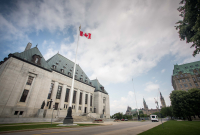Support strong Canadian climate journalism for 2025
Federal Natural Resources Minister Seamus O’Regan used the same phrase on Thursday to offer an olive branch to opponents of a government-owned oil pipeline that he did five months ago: “We see you and we hear you.”
Both times, the minister was reacting to a favourable court ruling for the Trans Mountain pipeline and expansion project, which has been owned and operated by Canada ever since the Trudeau government bought it from a Texas energy company in 2018.
On Thursday, Canada’s top court refused to hear an appeal from First Nations. One of those, the Coldwater Indian Band, fears that an oil spill would contaminate its drinking water source. It said the decision would not end its fight, and it may be “forced back to court” to protect its aquifer.
“To those who are disappointed with today’s SCC (Supreme Court of Canada) decision — we see you and we hear you,” O’Regan said in a statement. “Canada will continue to engage with Indigenous groups at each step of the project in the months and years to come, and in the spirit of partnership, to make sure we get this right.”
It was a similar sentiment to the one the minister expressed in February when the Federal Court of Appeal ruled the government’s second attempt at consulting with Indigenous peoples over the project was “genuine.”
“I want to say clearly to those who are disappointed with today’s court decision, we see you and we hear you,” he said at the time. Canada would “continue to engage with you and your communities,” he had added, and “take every step that we can to ensure that this project moves forward in the right way.”
'We are disappointed, but not surprised'
Coldwater, as well as Tsleil-Waututh Nation, Squamish Nation and Ts’elxwéyeqw Tribe, which had brought the legal challenge, disagreed with the February decision and asked the Supreme Court to hear the case. Coldwater Chief Lee Spahan said then that he felt Canada "had their minds set already on this decision.”
On Thursday, the Supreme Court dismissed that appeal, meaning that the earlier Federal Court of Appeal ruling stands, and Trans Mountain remains an approved project. The court did not give any reason for its decision, which is the custom.
“We are disappointed, but not surprised,” Spahan said Thursday. “We knew the chances of the SCC granting leave were slim given the momentum of the project and the Federal Court’s finding that protection of our water can still take place in future routing decisions, but we felt we had to use every tool available to us.”
The dismissal by the Supreme Court is the latest of several high-profile legal victories for the embattled pipeline project. In January, the court dismissed a separate appeal that would have allowed the B.C. government to regulate heavy oil flowing through its territory.
As well, in March it said it wouldn’t hear challenges from several groups including Youth Stop TMX, which tried to argue that the government didn’t fully examine the impact that the fossil fuel project would have on their “right to a healthy future.”
Canadian government scientists have concluded that global carbon pollution must be cut to “near zero” to limit the harsher impacts of the climate crisis, including more urban and coastal flooding, wildfires, threatened ecosystems and a loss of fresh water.
The Trudeau government has approved the oil pipeline project twice, first in November 2016, and then again in June 2019, after the Federal Court of Appeal had quashed its first approval.
A federal Crown corporation and its subsidiaries have been operating the existing pipeline, and proceeding with construction of the expansion project, which would roughly triple its capacity up to 890,000 barrels a day flowing from near Edmonton to a terminal in metro Vancouver.
'We may be forced back to court'
O’Regan said the government wants to expand the oil pipeline because it will “generate revenue to help fund clean energy and climate change solutions.” The government also says the construction is creating thousands of “good, well-paying jobs.”
But First Nations still have concerns about the project. Last month, Trans Mountain experienced an oil spill near a significant burial ground for Sumas First Nation, which is now calling for an independent investigation.
And this spring, Coldwater objected to the federal energy regulator’s handling of Trans Mountain oil pipeline hearings, saying its approach in the era of COVID-19 to abandon oral cross-examination in favour of written questions was unfair.
On Thursday, Spahan said Trans Mountain was “refusing to complete” a study of its aquifer and that O’Regan was “failing to fulfil his obligations to us and ensure that our drinking water is protected for future generations.”
“If Canada continues to fail us, and if Trans Mountain refuses to move their project out of the recharge zone of our aquifer, we may be forced back to court in an effort to protect our drinking water,” he said.
Carl Meyer / Local Journalism Initiative / Canada’s National Observer








Comments
“We see you and we hear you -- and we cheerfully ignore your concerns.”
Ottawa condescends to First Nations and pays lip service to reconcilation, all the while pushing the oil industry's disastrous agenda and flouting Canada's Paris commitments.
Minister O’Regan can hardly be surprised when First Nations land defenders respond with protests and rail blockades. Supported by climate activists and Canadians who care about their grandchildren.
Ottawa leaves First Nations and concerned citizens little choice.
Yep. It's sad how politics turns human beings into mere conduits... one might even say, pipelines... for bullshit.
Agree with Geoffrey Pounder comments. The words "We see you and we hear you" smacks of Justin Trudeau's comments. Say nice words and keep doing the same old policies. The words are tone deaf - simply mean we're continuing on the same path. Action plans and words are needed not platitudes!
Not to mention those who actually subscribe to Rule of Law, and expect it to be borne out in actions.
While yet more billions are being spent on fossil fuel infrastructure, the International Energy Agency and investment luminaries like Goldman Sachs are estimating that investments in renewables will surpass investment in fossil fuels for the first time in 2021. This is primarily because of the vast growth potential and big returns in renewables compared to the plateaued and likely stagnating carbon sector.
https://www.bloomberg.com/news/articles/2020-06-17/goldman-sees-16-tril…
Moreover, the investments will be catalyzed by increasing climate-fighting policies enacted by governments world wide (namely those with more mature commitments than Trudeau’s milquetoast initiatives to date) in addition to the very competitive energy prices of wind and solar, the massive sunk investments in electric vehicles by carmakers with en masse production coming on stream within two years, the advent of very significant advances in electricity storage technology, and the widespread calls by Canadians, not to mention the informed opinions of the Economist magazine and others, to make the pandemic recovery green.
Meaningless gestures and weak-kneed action following hollow rhetoric will further erode the Trudeau government’s already-conditional support among centrists and the left.
This is to say that TMX will probably end up having a relatively short lifespan at best, not the least due to risk management issues on land and in the Salish Sea, or a below expected or even negative return on the investment due to the worldwide demand destruction for oil that seems to be gathering for a grand reckoning by mid-decade.
All that and much more was communicated over the last few years by very knowledgable people through various media. The honest response by Trudeau’s Liberals to TMX opponents would have been, “We didn’t hear you because we were ignoring you in favour of industry and its myths.”
It's pretty sad when even the Vampire Squid is going renewable but the "care-so-much-about-climate-change" Liberals are still building pipelines.
"O’Regan said the government wants to expand the oil pipeline because it will “generate revenue to help fund clean energy and climate change solutions.” " I won't attempt to lampoon his remark, it is transparently ridiculous, more than that, it is farcical. It absolutely puts the lie to the Liberal government's paper commitment at the Paris climate accord sessions. And if there is a catastrophic spill at sea or in a major B.C. river-course, the criminal arrogance of the federal government's choice, (all done to appease the oil lobby and to curry hoped for votes in Alberta and Saskatchewan), will immediately come home to roost. Kalamazoo happened, a Canadian oil pipeline company caused it. It wasn't long ago.
https://en.wikipedia.org/wiki/Kalamazoo_River_oil_spill
The Exxon Valdez happened, the repercussions are still being felt, and it's 31 years later.
https://en.wikipedia.org/wiki/Exxon_Valdez_oil_spill
Canadian winters happen, and gales also absolutely happen off the west coast. This pipeline is a hideous collaboration between an industry that isn't in any genuine sense motivated by the public's best interest,and a federal government that claims it is.
I'd like to say one more thing, I think this has at least some merit. I believe the Supreme Court needs to do some self assessment. Last Wednesday was 'Canada Day', supposedly a day in which all Canadians are theoretically/hopefully going to feel a measure of common cause, a sense of happiness and satisfaction that we are all part of an ongoing project, experiment, history, enterprise (choose your own adjectives/descriptions) and that we're endeavoring to build on the past and help create a promising future. This future might be one that is inclusive, be one in which common dignity is valued too, and one in which integrity of indigenous peoples isn't trivialized as it has been in innumerable circumstances in our history, and in our present.
So regarding our news event in question, what has the Supreme Court just done? The very crack of dawn on the morning after 'Canada Day' it summarily throws out the legal challenge to TMX by indigenous groups, and offers them no explanation for doing so. This is 'tradition' with the court, to not only choose which challenges it will hear, but to disregard without comment any which it does not want to engage with. Now imagine how indigenous groups, which regard themselves (properly) as 'nations', experience this when they try to defend their deepest values and their sense of duty to protect their lands and waters for future generations, and are given utterly short shrift , are 'shown the exit',, by the nation of Canada, which itself claims to be aiming for reconciliation and active consultation with indigenous societies? Do the chief justices think that their conduct in this instance, their elective conduct, is in any forward looking way fostering ongoing respect for rule of law? Or do they imagine that their conduct, their judicial action, might in this instance be easily perceived as 1) utterly dismissive, 2) blithely arrogant, 3) completely 'tone deaf' . With very special emphasis on the last bullet point, I urge them to spend a few minutes, or perhaps even some hours engaging with themselves in their mirrors. If they are ultimately merely the sentinels of Canada's corporate community, they have done their jobs admirably,... they've bolstered shareholder confidence! But there is considerably more at stake in the ongoing project of this country than the X-Y-Z's of the 2020 economy.
I'm not as concerned about the tone, as about the substance.
TMX/the government claimed it had done as ordered in re further consultation.
It becomes clear that it didn't.
So isn't that a contempt of court issue?
Frankly, if JT is to continue claiming "national interest," it would behoove him to explain how, exactly, it is so. To date, there's been nothing but his say-so. Perhaps he needs to be challenged on that in court. Or maybe like the kings and gods of old: he says so, therefore it is.